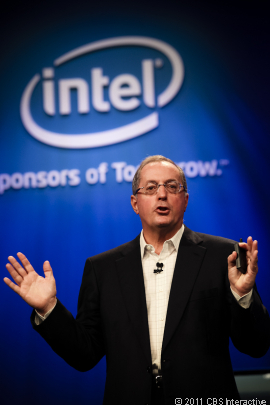Intel and Google join hands on Android development

Intel has revealed a new partnership with Google on Android, advances in the ultrabook device category and a new security technology that protects against zero-day exploits at its Intel Developer Forum.

Intel boss Paul Otellini has announced a new partnership with Google and advances in the ultrabook category of devices, at IDF in San Francisco. Photo credit: James Martin/CNET News
All future versions of Google's Android mobile operating system will be optimised for Intel's range of Atom processors, giving the company a boost in its efforts to displace ARM as the chipmaker of choice for smartphone manufacturers, Intel and Google announced on Tuesday at the event in San Francisco.
The joint development effort will see all future versions of the popular Android operating system receive tweaks from the kernel level and up, to support Atom-based Intel architecture chips.
"Over the last few years, Intel has learned a lot of things about smartphone silicon and the Intel design," Intel's chief executive, Paul Otellini, said in his keynote speech. "Our goal here is not easy but it is very simple — we want to make Intel the platform of choice for smartphone ecosystems."
Intel has struggled to break into the smartphone market while its main competitor in the sector, ARM, has ploughed ahead: Apple's iPhone uses a low-powered ARM Cortex processor, while many popular handsets use ARM-based chips from Qualcomm and other licensees.
That is set to change, Otellini said, before welcoming Google's senior vice president of mobile, Andy Rubin, onto the stage. Rubin walked on with a Medfield-based smartphone in his hand. Intel first demonstrated a handset powered by the chip at Mobile World Congress in February.
"We're going to collaborate very closely to make sure Android can be optimised for the Intel architecture," Rubin said. "All future releases" of Android will be tweaked and fitted for the Intel architecture, he added.
Otellini said he expects Intel-based phones to commence shipping in the first half of 2012.
Ultrabook push
Intel's push into smartphones goes hand-in-hand with its attempt to take control of low-powered laptops via its efforts in the ultrabook device category.
"The ultrabook is our vision that delivers the most satisfying and complete user experience," Otellini said.
A range of ultrabooks developed with a variety of partners should be available to buy in the holiday season of 2011, with further products on the way in 2012, he added. Ivy Bridge, Intel's first chip built with its 22nm tri-gate process, is expected to make an appearance in ultrabooks early in 2012, Otellini added.
He said an ultrabook in 2013 should be capable of existing in standby mode for up to 10 days, thanks to Intel's upcoming Haswell chip, which is expected to launch that year. Haswell should also allow the devices to provide "all-day usage", Otellini said, but did not specify how long that actually was.
"We've targeted Haswell's design not just for lower power, but we're targeting a system-level power management framework that is supported by efficient system design throughout the ecosystem," Otellini told the audience.
Deepsafe
Intel also demonstrated a security technology it has developed with McAfee, which it acquired in August 2010. Deepsafe is designed to stop zero-day exploits from compromising systems by embedding security software between the OS and the CPU, rather than purely within the OS.
Deepsafe is described by McAfee as a "hardware-assisted" technology designed to defend against advanced persistent threats (APT) and other types of modern cyberattacks. The technology can detect rootkits that target the kernel, which can hide from typical OS-based security products, according to McAfee.
Intel first unveiled the hardware-based defence against zero-day attacks in January. At the time it did not disclose the extent to which McAfee had been involved in Deepsafe's development.
"A combination of McAfee's deep knowledge of malware methodology and Intel's deep understanding of system architecture were vital elements in creating this new capability," McAfee said on Tuesday (PDF).
Finally, Otellini said Intel is in the process of fitting out its fabs for chips built with a 14nm process in time for shipping in 2013.
Get the latest technology news and analysis, blogs and reviews delivered directly to your inbox with ZDNet UK's newsletters.